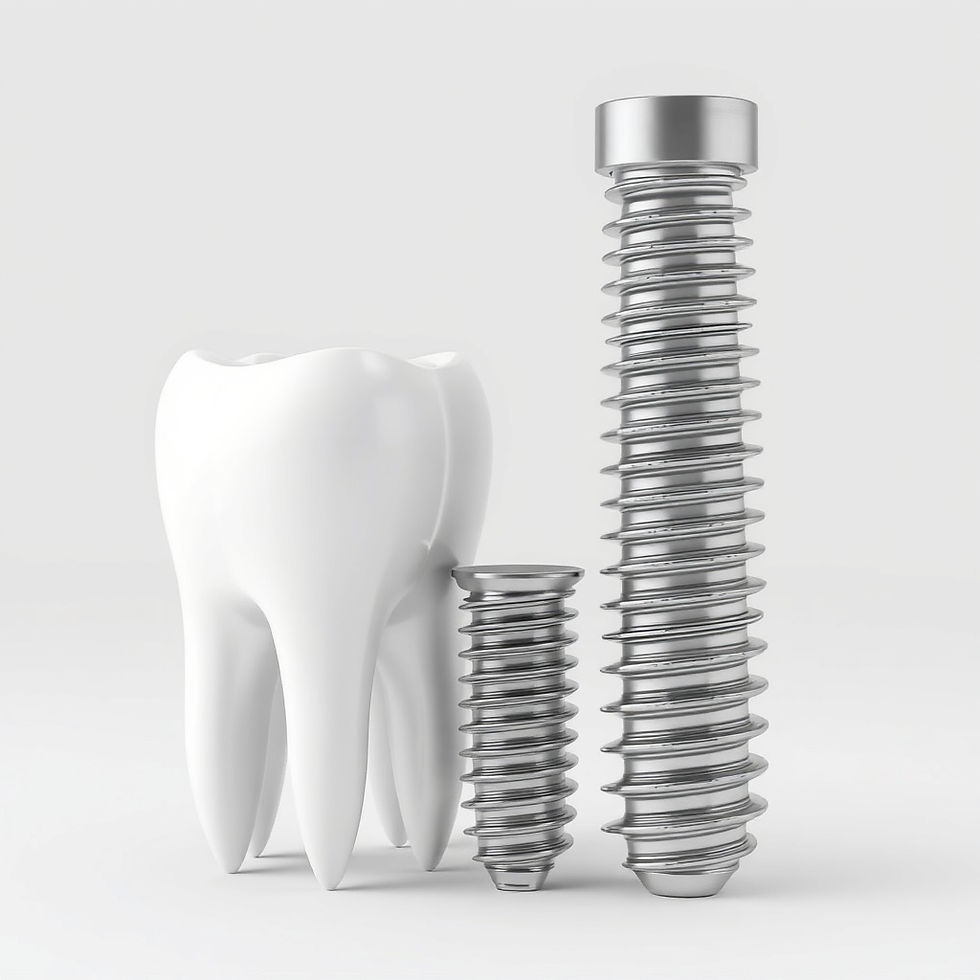How Long is Wisdom Teeth Surgery
- plurefy com
- Aug 19, 2025
- 4 min read

Removing wisdom teeth is a common procedure that many individuals undergo in their late teens or early adulthood. If you or someone you know is planning to have this operation, you might be curious about how long the surgery will take. Knowing the timeline can help reduce anxiety and assist in planning. This article will examine the different factors that affect the duration of wisdom teeth surgery and what you can expect during the procedure.
Wisdom teeth, also referred to as third molars, are the final set of molars that typically emerge in a person's late teens or early twenties. While some people have no problems with their wisdom teeth, others face issues like crowding, impaction, or infection. When these complications occur, dentists or oral surgeons often advise the removal of wisdom teeth.
The Role of Wisdom Teeth in Dental Anatomy
Wisdom teeth were once beneficial for our ancestors, who had larger jaws and a diet that demanded more chewing strength. However, as human diets have changed and jaws have become smaller, these teeth are often unnecessary in modern times. Understanding their original function can help explain why they often cause problems today.
Common Problems Caused by Wisdom Teeth
Many people encounter issues with their wisdom teeth, such as discomfort, swelling, and difficulty cleaning the area. These problems can result in cavities or gum disease if not addressed. Being aware of potential complications can help you decide if surgery is the right option for you.
Long-Term Benefits of Removing Wisdom Teeth
Extracting problematic wisdom teeth can help prevent a variety of dental problems in the future. By removing potential sources of infection or misalignment, you can achieve better oral hygiene and health. It's important to consider these advantages when deciding on surgery.
Factors Affecting the Duration of Wisdom Teeth Surgery
The length of the surgery can vary based on several factors:
Number of Teeth Being Removed
The most significant factor influencing the duration of the procedure is the number of wisdom teeth being extracted. If all four wisdom teeth need to be removed, the surgery will naturally take longer than if only one or two are being extracted. Each additional tooth requires more time for careful removal and thorough examination.
Complexity of the Case
The complexity of the surgery can influence its duration. Some wisdom teeth are easy to remove, while others are impacted or awkwardly positioned, requiring more time and expertise for extraction. Complex cases often involve extra steps, like bone removal or tooth sectioning, which can extend the procedure.
Anesthesia Used
The type of anesthesia used can also affect the length of the surgery. Local anesthesia might result in a quicker procedure compared to general anesthesia, which demands more preparation and recovery time. Different anesthesia types also impact post-operative recovery, influencing the overall timeline of the procedure.
Surgeon’s Experience and Technique
A surgeon's experience and the techniques they employ can greatly impact the surgery's duration. Experienced surgeons may perform extractions more efficiently, reducing operation time. The choice of surgical instruments and methods also affects how quickly the procedure can be completed.
Patient's Health and Anatomy
The patient's overall health and anatomical structure can affect the surgery's length. Patients with underlying health conditions or unique anatomical features may need more time for careful handling and extraction. These factors can be discussed with your surgeon during pre-surgical consultations.
How Long is Wisdom Teeth Surgery
The duration of wisdom teeth surgery can vary, but it generally lasts between 45 minutes and an hour and a half. Here's a general overview of what to expect:
Single Tooth Removal
If only one wisdom tooth is being extracted, the procedure might take as little as 20 to 30 minutes. This is especially likely if the tooth is fully erupted and properly positioned. Simple extractions tend to be quicker and involve fewer complications, resulting in a smoother surgical process.
Multiple Teeth Removal
For removing all four wisdom teeth, the surgery could take up to an hour or more. The complexity of each tooth's position significantly influences the exact timing. More teeth mean more incisions, extractions, and closures, which increases the total time needed.
Impacted Teeth
When teeth are impacted, especially those embedded in the jawbone, the surgery may take longer. Impacted teeth require more careful extraction to avoid complications. Additional procedures, such as bone removal, can further extend the surgery duration.
Variability in Surgical Techniques
Various surgical methods can result in differences in the duration of the procedure. Some surgeons employ advanced techniques to expedite the process, while others follow a more traditional approach. Discussing these methods with your surgeon can provide clarity on what to expect.
What to Expect During the Procedure
Knowing the steps involved in wisdom teeth surgery can help you feel more comfortable. Here's a general overview of what usually occurs:
Pre-Surgery Preparation
Before the surgery starts, your oral surgeon will review your medical history and take X-rays to evaluate the position of your wisdom teeth. You'll receive anesthesia to ensure a pain-free experience during the procedure. This preparation stage is essential for planning the surgery and reducing potential risks.
The Surgery Itself
Incision: The surgeon creates an incision in the gum tissue to reach the tooth. This step is vital for exposing the tooth and providing a clear path for extraction.
Extraction: The surgeon uses specialized tools to extract the tooth. If the tooth is impacted, some bone around it may need to be removed. This process requires precision to avoid harming nearby structures.
Closure: After removing the tooth, the incision site is cleaned and stitched closed if needed. Proper closure helps with healing and lowers the risk of infection.
Post-Surgery Care

by Jonathan Borba (https://unsplash.com/@jonathanborba)
After the surgery, you'll be observed briefly to ensure the anesthesia is wearing off safely. Your surgeon will give you post-operative care instructions, including pain management and dietary restrictions. Adhering to these guidelines is crucial for a smooth recovery and reducing complications.
Communication with Your Surgeon
Open communication with your surgeon before, during, and after the procedure is vital. Asking questions and expressing any concerns can help you feel more comfortable and informed. Your surgeon can provide reassurance and detailed explanations to ease your mind.
Recovery Time and Tips
While the surgery itself may not take long, recovery is a crucial aspect of the process. Here's what you can expect and some tips to aid in your recovery:
Immediate Recovery
Most people can go home the same day after their wisdom teeth surgery. It's essential to have someone drive you home, as you may feel groggy from the anesthesia. Ensuring you have assistance and a comfortable environment at home can facilitate the initial recovery phase.
Full Recovery Timeline
First 24 Hours: Rest and use ice packs to decrease swelling. This time is essential for reducing discomfort and managing initial symptoms.
First Few Days: Consume soft foods and avoid intense activities. Proper nutrition and activity levels aid in healing and prevent complications.
1-2 Weeks: Most swelling and discomfort should lessen, and stitches (if used) may dissolve or be removed. Gradually returning to normal activities is usually possible by this point.
Tips for a Smooth Recovery
Follow Instructions: Stick to your surgeon's post-operative care guidelines. Following these instructions is crucial for a successful recovery.
Manage Pain: Take prescribed or over-the-counter pain medication as directed. Proper pain management can improve comfort and support healing.
Avoid Irritants: Avoid smoking or using straws, as these can interfere with healing. Protecting the surgical site is vital to prevent complications.
Signs to Watch For
Being aware of potential complications can help you act promptly if issues arise. Look out for signs of infection, such as fever, increased pain, or unusual discharge. Contact your surgeon immediately if you experience any concerning symptoms.
Conclusion
Wisdom teeth surgery is a relatively quick procedure, usually taking between 45 minutes to an hour and a half, depending on various factors. Understanding the process and preparing for recovery can help ensure a smoother experience. If you have any concerns or questions, don't hesitate to contact your oral surgeon for personalized advice.
By being informed and prepared, you can approach your wisdom teeth surgery with confidence and peace of mind. Remember, the benefits of removing problematic wisdom teeth often outweigh the temporary discomfort of the procedure, leading to a healthier, more comfortable smile in the long run.










Comments